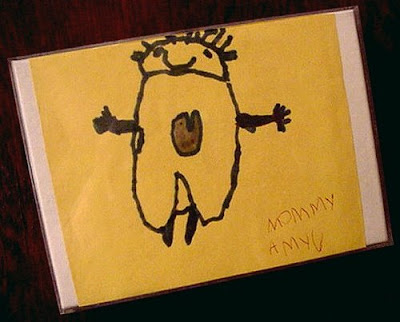
If your home is overflowing with evidence of your child's artistic prowess and school accomplishments, you may need some help deciding what to keep and what to toss. Here are some words of wisdom from my fellow professional organizers, and from some other parents.
Marilyn Bohn explains why it's necessary to make some choices:
Just think; if you save everything your child brings home, by the time they are in college you will have a two car garage full and overflowing with just their paper work and it will be spilling into your home. (I actually read about a woman who had saved everything and this was the result.)Gail makes a similar point, and provides some guidance on what to save:
I believe it! I did some math figuring if you save just three pieces of paper a week, times four weeks in a month times 9 months in a year (figuring school is not in session for 12 months) times 8 years in school (pre-school through 6th grade) that is a total of 864 pieces of paper.
... A very wise preschool teacher passed on this little gem, "little kids are into process, not product. Kids live in the moment; they enjoy the moment of making the art but are quite casual about disposing of it.
If you were to save each and every piece of paper our children worked on in their 13 years of school, you could fill an entire standard bedroom! ...MaryJo Monroe has this advice:
I typically save art that is art. Not the painting swirled in a circle with the teacher writing "A Motorcycle" above it. I also keep things that show progression in their development. Be it writing letters, or drawing a flower, or a worksheet, I will be able to look back as see their attempts at mastering a new learning challenge. Also, I save items that are about them. A self portrait, a interview from preschool about what they want to be when they grow up, a drawing of the family, an essay of their summer vacation, and so forth. You don’t need to keep the 4th grade book report they received an A++ on, unless you somehow are related to the person in the story!
First of all, ask your child to sort through the papers to pick out his or her favorites. Then, it's your turn to sort through what's left. If you have a hard time deciding what to keep and what to toss, ask yourself: Is this artwork some of the best work little Jimmy has ever done? Is it really representative of who he was at that age? Is this a piece that will still be meaningful 20 years from now?And Angela Esnouf from Australia also emphasizes involving your child in the decision-making:
In her October 2008 thesis "From the Refrigerator Door to the Art Gallery Floor: Young Children’s Experiences with the Display of Their Own Visual Artwork", Danielle Jay Boone, writes "children like to make choices about their own artwork". In any organising project involving children, I always recommend including them in the decision-making process. Organising children’s art is no different. Like any artist, a child will connect more with some works of art than with others. Only they know the level of commitment they put into producing their art, the care they took. Including children in the decision-making process also helps them build important life skills.And here is some advice from Ms Sisyphus, commenting on ParentDish:
OK, so your child is now helping you choose which pieces to keep. Here are some points to consider
- Some drawings represent milestones, the next step in your child’s development.
- Some artworks were made for a special occasion, like Mothers Day.
- Some are just beautiful.
You have to take the long view here or you will go insane.Even if you're digitizing the schoolwork - taking photos, or scanning papers - it pays to be selective. Again, to quote Gail:
You only keep the most precious pieces. You know which ones they are. The ones that even months after they come home you look at them and *remember*. The first time they print their names, write a sentence, etc., stay. One self portrait per year.
Create a digital scrapbook of their work. You will be able to arrange a book in no time that shows their development and progression. This will cut down on the size/volume of papers you accumulate. This doesn’t give you "permission" to save it all. Again, be picky about what you save. Your child will not appreciate your hard work of scrap-booking all they did in school if it is a 20 volume series! Use what is most valuable, and toss the rest.[photo by EraPhernalia Vintage / Cheryl, licensed under Creative Commons]

5 comments:
As someone who literally has all of her life age 0-18 in six large bins, I can recommend what my mom did: she put every piece of art/report card/etc in a large drawer in our dining room, and at the end of the year when we brought home our backpacks and all our schoolbooks and such, we'd sit down with her for an hour and go through it all - she'd pick favorites, we'd each pick favorites. And all of it had to fit in a large envelope (the tannish ones slightly larger than 8.5x11). She'd label each with our name and year, and put them in the closet. Ta-da!
Bridget, that sounds like a good approach!
Millions of parents save their kids' artwork, sometimes for decades. It's just something that is difficult to toss. Artimusart.com is a new and innovative company that takes all the artwork, not just a piece or two and transform all of it into a Hard Cover book and Web gallery where you can see, send and share the artwork electronically. A childhood art collection book enables you preserve the art with out keeping it and allows children to admire and show off their creative works. www.artimusart.com
Dana Hostage
Dana, I wrote about Artimus Art a long time ago!
Hi Jeri! You also mentioned SouvenarteBooks in your review several years ago. We have been busy making the most beautiful books of children's art for the last couple of years. Soon celebrating our third year! Thanks, Susan Berman, Founder,
SouvenarteBooks
Post a Comment